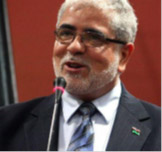On Friday, March 20, 2015, the Middle East and North Africa Program at the Asan Institute for Policy Studies hosted a roundtable with H.E. Dr. Mustafa Abushagur, former Deputy Prime Minister of Libya. Dr. Abushagur began his lecture by outlining the country’s long history of authoritarian rule and laying out the events that led to the Libyan Civil War. Stating that the “oppression had been building,” Dr. Abushagur explained that many of Libya’s youth were compelled to rise up in the hopes of securing a better future for themselves, one where there is freedom, dignity, and democratic processes. The subsequent political transition that took place was momentous, and it led to Libya’s first democratic election in 56 years. The outcome was a peaceful transition of power from the National Transitional Council, which had served as the de facto government of Libya during and after the civil war upon overthrowing long-time dictator Muammar Qadhafi, to the General National Congress. The tremendous voter turnout and promise of democratic freedom through electoral processes and rise of political parties captivated the country and seemed to pave the way for a new era.
However, the liberation of Libya gave rise to a new set of problems, the consequences of which the international community is still dealing with today. For example, Libya’s pursuit of democracy occurred without the proper democratic institutional structures in place, such as federal law enforcement. This lack of mechanisms to safeguard democratic power and authority created a vacuum for armed militia groups that had formed during the Libyan Civil War. Undermining executive authority, they have raided congressional meetings to complicate what is already a fraught political process. Moreover, political parties within the country continuously fail to negotiate and compromise. Such kinds of political stalemates lead to an ineffective government that increasingly loses legitimacy in the eyes of its constituents.
Consequently, this has led to the rise of extremism and terrorism, which has spilled over to neighboring regions and has affected the security of the entire international community. Wreaking havoc on the legal order, terrorist organizations have become increasingly successful at using social media to attract a following and fill their ranks. As seen by the recent defection of a South Korean teenager in January to Islamic State forces in Syria, this type of extremism has far-reaching allure and consequences. As such, Dr. Abushagur advocated the need for international cooperation to address the universal effects of terrorism. Because it is impossible to isolate Libya’s problems within the country’s borders, the international community must engage with one another to stop the spread of extremist ideology and factions.
Date/Time: Friday, March 20, 2015/4:00pm-5:30pm
Place: Conference Room (2F), The Asan Institute for Policy Studies
Speaker
 Dr. Mustafa A.G. Abushagur is the former Deputy Prime Minister of Libya and a member of the Libyan House of Representatives. On September 12, 2012, Dr. Abushagur became the first elected Prime Minister-designate in the modern history of Libya. However, he was removed from office on October 7, 2012, when he failed to receive congressional approval for his cabinet nominees. In the July 2014 elections, Dr. Abushagur was elected to the Libyan House of Representatives, where he won the largest number of votes won by any candidate in the country. Before his appointment as Deputy Prime Minister in 2011, Dr. Abushagur enjoyed a distinguished career as a university professor and entrepreneur. He has taught at the Rochester Institute of Technology (RIT)—where he was the founding director of the Ph.D. Program in Microsystems Engineering and the founding president of the university’s Dubai campus—the University of Alabama in Huntsville, and the University of Rochester. Dr. Abushagur is also the founder of several successful start-up companies working on optical fiber networks. He remains a leading figure in the fields of electrical and computer engineering, holding three scientific patents, fellowships at the Optical Society of America and the International Society of Optics and Photonics, and is also the recipient of numerous research grants and awards. Dr. Abushagur received a B.Sc. in electrical engineering from the University of Tripoli, and his M.Sc. and Ph.D. in electrical engineering from the California Institute of Technology (Caltech).
Dr. Mustafa A.G. Abushagur is the former Deputy Prime Minister of Libya and a member of the Libyan House of Representatives. On September 12, 2012, Dr. Abushagur became the first elected Prime Minister-designate in the modern history of Libya. However, he was removed from office on October 7, 2012, when he failed to receive congressional approval for his cabinet nominees. In the July 2014 elections, Dr. Abushagur was elected to the Libyan House of Representatives, where he won the largest number of votes won by any candidate in the country. Before his appointment as Deputy Prime Minister in 2011, Dr. Abushagur enjoyed a distinguished career as a university professor and entrepreneur. He has taught at the Rochester Institute of Technology (RIT)—where he was the founding director of the Ph.D. Program in Microsystems Engineering and the founding president of the university’s Dubai campus—the University of Alabama in Huntsville, and the University of Rochester. Dr. Abushagur is also the founder of several successful start-up companies working on optical fiber networks. He remains a leading figure in the fields of electrical and computer engineering, holding three scientific patents, fellowships at the Optical Society of America and the International Society of Optics and Photonics, and is also the recipient of numerous research grants and awards. Dr. Abushagur received a B.Sc. in electrical engineering from the University of Tripoli, and his M.Sc. and Ph.D. in electrical engineering from the California Institute of Technology (Caltech).

 Facebook
Facebook Twitter
Twitter








